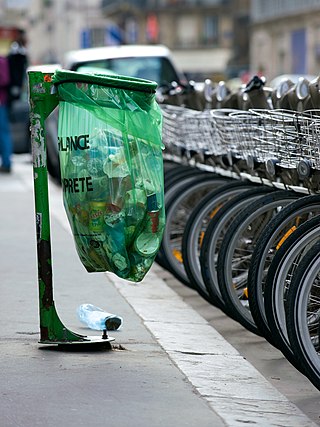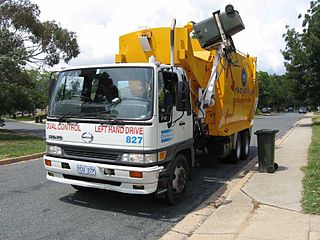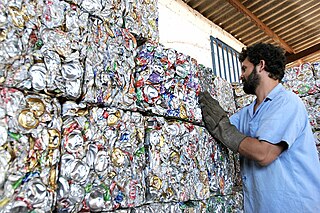
Mutt Mitt is a brand of plastic mitts used to pick up waste from pets, especially dogs. [1] [2]

Mutt Mitt is a brand of plastic mitts used to pick up waste from pets, especially dogs. [1] [2]
Mutt Mitt plastic mitts are two-ply with a bottom pouch, and are constructed so that the user cannot get waste on their hands. They are also puncture-resistant, and leave no mess when the mitt is turned inside out. They are discarded after waste has been picked up. [3]
Mutt Mitts are single-use for non-commercial customers and come in packages of 300 and 500. [1]

The Basel Convention on the Control of Transboundary Movements of Hazardous Wastes and Their Disposal, usually known as the Basel Convention, is an international treaty that was designed to reduce the movements of hazardous waste between nations, and specifically to restrict the transfer of hazardous waste from developed to less developed countries. It does not address the movement of radioactive waste, controlled by the International Atomic Energy Agency. The Basel Convention is also intended to minimize the rate and toxicity of wastes generated, to ensure their environmentally sound management as closely as possible to the source of generation, and to assist developing countries in environmentally sound management of the hazardous and other wastes they generate.

Polyvinyl chloride (alternatively: poly(vinyl chloride), colloquial: vinyl or polyvinyl; abbreviated: PVC) is the world's third-most widely produced synthetic polymer of plastic (after polyethylene and polypropylene). About 40 million tons of PVC are produced each year.

Recycling is the process of converting waste materials into new materials and objects. This concept often includes the recovery of energy from waste materials. The recyclability of a material depends on its ability to reacquire the properties it had in its original state. It is an alternative to "conventional" waste disposal that can save material and help lower greenhouse gas emissions. It can also prevent the waste of potentially useful materials and reduce the consumption of fresh raw materials, reducing energy use, air pollution and water pollution.

Litter consists of waste products that have been discarded incorrectly, without consent, at an unsuitable location. The waste is objects, often man-made, such as aluminum cans, paper cups, food wrappers, cardboard boxes or plastic bottles, but also large and hazardous items of rubbish such as tires, electrical appliances, electronics, batteries and large industrial containers are sometimes dumped in isolated locations, such as national forests and other public lands.

In use by consumers worldwide since the 1960s, shopping bags made from various kinds of plastic, are variously called plastic shopping bags, carrier bags, or plastic grocery bags. They a sometimes refereed to as single-use bags—referring to carrying items from a store to a home—although, it is rare for bags to be worn out after single use, and in the past some retailers incentivised customers to reuse 'single use' bags by offering loyalty points to those doing so. Even after they are no longer used for shopping, reuse of these bags for storage or trash is common, and modern plastic shopping bags are increasingly recyclable or compostable - at the Co-op for example. In recent decades, numerous countries have introduced legislation restricting the provision of plastic bags, in a bid to reduce littering and plastic pollution.

A plastic bag, poly bag, or pouch is a type of container made of thin, flexible, plastic film, nonwoven fabric, or plastic textile. Plastic bags are used for containing and transporting goods such as foods, produce, powders, ice, magazines, chemicals, and waste. It is a common form of packaging.

A bin bag, rubbish bag, garbage bag, bin liner, trash bag or refuse sack is a disposable receptable for solid waste. These bags are useful to line the insides of waste containers to prevent the insides of the container from becoming coated in waste material. Most bags today are made out of plastic, and are typically black, white, or green in color.

Marine debris, also known as marine litter, is human-created solid material that has deliberately or accidentally been released in seas or the ocean. Floating oceanic debris tends to accumulate at the center of gyres and on coastlines, frequently washing aground, when it is known as beach litter or tidewrack. Deliberate disposal of wastes at sea is called ocean dumping. Naturally occurring debris, such as driftwood and drift seeds, are also present. With the increasing use of plastic, human influence has become an issue as many types of (petrochemical) plastics do not biodegrade quickly, as would natural or organic materials. The largest single type of plastic pollution (~10%) and majority of large plastic in the oceans is discarded and lost nets from the fishing industry. Waterborne plastic poses a serious threat to fish, seabirds, marine reptiles, and marine mammals, as well as to boats and coasts.

Plastic recycling is the processing of plastic waste into other products. Recycling can reduce dependence on landfill, conserve resources and protect the environment from plastic pollution and greenhouse gas emissions. Recycling rates lag behind those of other recoverable materials, such as aluminium, glass and paper. From the start of plastic production through to 2015, the world produced around 6.3 billion tonnes of plastic waste, only 9% of which has been recycled and only ~1% has been recycled more than once. Of the remaining waste, 12% was incinerated and 79% was either sent to landfills or lost to the environment as pollution.

A pooper-scooper, or poop scoop, is a device used to pick up animal feces from public places and yards, particularly those of dogs. Pooper-scooper devices often have a bag or bag attachment. 'Poop bags' are alternatives to pooper scoopers, and are simply a bag, usually turned inside out, to carry the feces to a proper disposal area. Sometimes, the person performing the cleanup is also known as the pooper-scooper.

The Great Pacific Garbage Patch is a garbage patch, a gyre of marine debris particles, in the central North Pacific Ocean. It is located roughly from 135°W to 155°W and 35°N to 42°N. The collection of plastic and floating trash originates from the Pacific Rim, including countries in Asia, North America, and South America.

Kerbside collection or curbside collection is a service provided to households, typically in urban and suburban areas, of collecting and disposing of household waste and recyclables. It is usually accomplished by personnel using specially built vehicles to pick up household waste in containers that are acceptable to, or prescribed by, the municipality and are placed on the kerb.

TerraCycle is a private U.S.-based recycling business headquartered in Trenton, New Jersey. It primarily runs a volunteer-based recycling platform to collect non-recyclable pre-consumer and post-consumer waste on behalf of corporate donors, municipalities, and individuals to turn it into raw material to be used in new products. TerraCycle also manages Loop, a consumer-products shopping service with reusable packaging.

The blue box recycling system (BBRS) was initially a waste management system used by Canadian municipalities to collect source separated household waste materials for the purpose of recycling. The first full-scale community wide BBRS was implemented in 1983 by the waste management contractor Ontario Total Recycling Systems Ltd. for the City of Kitchener, Ontario. The blue box recycling system was implemented as part of the city's waste management procedures. The blue box system and variations of it remain in place in hundreds of cities around the world.

Plastics are a wide range of synthetic or semisynthetic materials that use polymers as a main ingredient. Their plasticity makes it possible for plastics to be molded, extruded, or pressed into solid objects of various shapes. This adaptability, combined with a wide range of other properties, such as being lightweight, durable, flexible, nontoxic, and inexpensive to produce, has led to their widespread use around the world. Most plastics are derived from natural gas and petroleum, and a small fraction from renewable materials. One such material polylactic acid.

Brazil's overall recycling rate is 4%, according to Abrelpe but differs a lot from city to city. Brazil has no structured municipal recycling programs. Only 6.4% of Brazilian municipalities have official waste recycling programs and more than 70% of Brazilians do not separate their recyclable materials into proper bins. The recovery of recyclable material is largely left to waste pickers, who earn a living by collecting recyclables and selling them to private recycling companies.
Products made from a variety of materials can be recycled using a number of processes.
A plastic bag ban or charge is a law that restricts the use of lightweight plastic bags at retail establishments. In the early 21st century, there has been a global trend towards the phase-out of lightweight plastic bags. Single-use plastic shopping bags, commonly made from low-density polyethylene (LDPE) plastic, have traditionally been given for free to customers by stores when purchasing goods: the bags have long been considered a convenient, cheap, and hygienic way of transporting items. Problems associated with plastic bags include use of non-renewable resources, difficulties during disposal, and environmental impacts. Concurrently with the reduction in lightweight plastic bags, shops have introduced reusable shopping bags.

Plastic pollution is the accumulation of plastic objects and particles in the Earth's environment that adversely affects humans, wildlife and their habitat. Plastics that act as pollutants are categorized by size into micro-, meso-, or macro debris. Plastics are inexpensive and durable, making them very adaptable for different uses; as a result, manufacturers choose to use plastic over other materials. However, the chemical structure of most plastics renders them resistant to many natural processes of degradation and as a result they are slow to degrade. Together, these two factors allow large volumes of plastic to enter the environment as mismanaged waste which persists in the ecosystem and travels throughout food webs.

Lit for Life is an annual literary festival organised by the English daily The Hindu in Chennai, India. The festival was inaugurated in 2010, where it was part of the celebration of the 20th anniversary of The Hindu's Literary Review. In 2011 the Lit for Life became an independent one-day event. It has over the years developed into a three-day festival of literature and thought, featuring notable authors and speakers from all over the world. In 2020, the festival, that always takes place in mid-January, will celebrate its 10th anniversary. Main initiator and organiser of the Lit for Life is Dr Nirmala Lakshman, Director of The Hindu Group of Publications, and Chairperson of the Board of The Hindu Tamil.